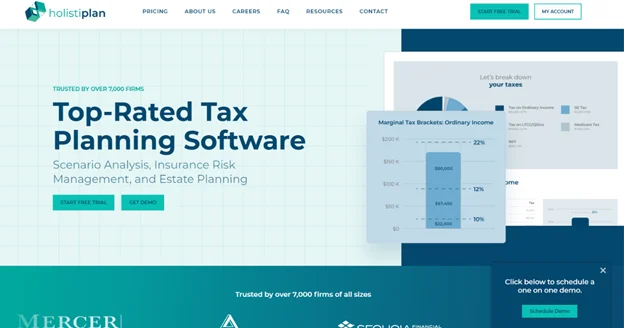Financial advisors help manage all aspects of one’s finances, from investments to retirement planning, and do so through comprehensive research and understanding of market trends and the specific needs of each client. And, of course, the world in which data and client needs are constantly changing can be overwhelming; this is where AI tools come into play.
AI tools for financial advisors could actually help automate most of those mundane, time-consuming tasks, including data entry, reports, and portfolio management. And apart from saving time, it even helps in better decision-making, as large pieces of data can be processed at lightning speed. The AI engine can easily mark the patterns within the market, giving the advisors real-time insights that, in turn, enable them to make better-informed decisions for clients.
Another is enriching the experiences of clients through the possibilities of AI. Assistance from AI-driven analytics in financial advising helps personalize advice, predict future needs in clients, and generally enhance communication. For instance, AI can remind investment updates or determine when a client is ready for retirement planning. This personal touch builds stronger relationships and trust. Such tools, when empowered with the ChatGPT best practices, tend to improve communication, thus leading to good feedback. Quick and efficient responses to client queries would eventually be provided by a financial advisor to clients through the use of ChatGPT.
Table of Contents
Benefits of AI Tools
AI Tools for Financial Advisors bring forth a variety of reasons that may fundamentally change the effectiveness and efficiency of services delivered. Let’s now take a closer look at the most important of these.
1. Time-saving through Automation
The greatest advantage of AI to financial advisors is the automation of mundane tasks. Advisers usually waste thousands of hours inputting client details, running reports, and dealing with administration work with outdated software. AI tools can automate these tasks, saving precious hours. For example, tracking changes in market movements can be automated by AI; detailed financial reports may be automated and even prepare tax documentation. In this way, time consumed on the strategies as well as relating to clients might rise. End.
2. Sophisticated Decision-Making Ability
Another area where AI tools afford superior decision-making capability. Many financial advisors would have to scan through voluminous data to make better recommendations. AI processes humongous amounts of data in a fraction of a second. Which makes predictions about trends and patterns even a human analyst might miss. It can range from as little as market predictions or a detailed review of the financial health of the clients. AI provides real-time insights, thereby equipping an advisor to make better decisions with a much lower risk of any kind of error. By enabling better financial advisory services to the client.
3. Client Personalization
The other benefit AI tools provide is customized services. Using AI, financial advisors can be able to analyze the behavior and preferences of their clients. And therefore provide tailored advice that will meet each client’s needs. For instance, AI can help them identify the moment a client might need to change their investment strategy or even is approaching an essential life stage, like retirement. Personalized advice creates trust and strengthens relationships with clients.
Personal Experience: Saving Time through AI Tools
Imagine an advisor inputting data for every client. This would take hours for such a huge portfolio. After embracing AI tools, the advisor comes up with a system where the computer is majorly utilized in this aspect but saves almost half the time spent on administrative work. They can then spend more time trying to understand clients’ goals and how best they can be proposed to investors. This is a personal experience that entails the use of AI tools to not only make the work process more efficient but also improve the quality of the service.
Prompt Engineering and AI Systems
When it is possible to combine prompt engineering frameworks within AI tools, it enhances their functionality. Prompt engineering in GenAi systems have been observed to help guide AI systems such as Generative AI, meaning that their responses will be relevant and accurate. For example, the financial advisor may make use of well-thought-out prompts to ensure that the AI tool focuses on some specific needs of the clients or market trends
Such advanced prompt engineering integration with AI will add a further layer of precision in ensuring that AI tools are capable of maximizing performance in day-to-day activities.
Popular AI Tools for Financial Advisors
AI tools for financial advisors become crucial in making client services better and increasing overall efficiency. Here are three popular tools used in the industry:
1. Robo-advisors
Computer programs known as robo-advisors are used by financial advisors to improve investment portfolio management. Computer algorithms use these facilities to establish the risk capacity of a client, investment goals, and situation in the market to provide the best suitable portfolio strategies. Robo-advisors help financial advisors manage more clients and offer each client personalized investment advice by automating portfolio management. They are mainly useful for managing portfolio adjustments that are recurrent.
2. AI Analytical Tools
All of them basically make quick overviews of market information and trend analysis pertinent to their purpose. AI analytics predict a change in the market and scrutinize vast finance data for an advisor’s smart decision-making process. Comparing portfolios with today’s market conditions also leads to better understanding for smarter investment planning by these tools.
3. Chatbot
They are very vital in terms of proper customer care. For example, it addresses simple client questions and can even answer some of the common queries while taking appointments. By relieving some of the daily chores off financial advisors, it enables them to spend more time on complicated client needs.
Real-world Example: A robo-advisor can make giving investment suggestions easier for a financial advisor. It allows him to focus on custom plans for clients, while the AI handles routine portfolio management.
Enhancing Client Relationships Using AI
It basically changes the way that financial advisors communicate with and deliver assistance to their clients. AI, using real-time monitoring of client interactions, helps them identify patterns and preferences that enable them to deliver more informative communications. For example, how many times a client checks on their investment portfolios, or what reaction they have in response to a market change. With this, the device will be able to guide how one gets to them—updating them every time they match in the market or when to change the advice depending on their responses.
AI can also indicate what clients require by noticing their past activities. For instance, if a client is approaching retirement and in the past has shown more interest in long-term investment, AI devices will be able to pick this up. That alerts advisers to discuss retirement planning with the client before raising it themselves. It improves service and pleases the customer.
Popular AI Tools for Financial Advice
Wealthfront
Wealthfront is indeed an automated investment service—another name coined to be a robo-advisor. It helps wealth advisors manage portfolios by using smart computer algorithms in producing customized investment advice and doing things like tax-loss harvesting and portfolio rebalancing. Advisors can give their clients an affordable management style that ensures the investments fit within the financial goals of their clients.

Holistiplan
Holistiplan is AI-driven finance planning and tax analysis software; hence, it imports clients’ returns and also communicates the amount of saving that will be created through taxes with future financial predictions. This enhances a better tax strategy and long-term planning for their clients as advisors.

Addepar
Addepar is an AI technology platform that allows an advisor to manage sophisticated portfolios. As it incorporates data from many accounts, it is able to provide a comprehensive view of the investment. The advisor then makes better sense of recommendations as he/she sees the whole picture. Its AI insights help track trends and produce improvements in client portfolios using real-time data.

Conclusion
Summarily, it changes the way advisors do their work because it saves time as well as the basis of making decisions about data. Further, there is provision for personalized services to clients. It also allows the financial advisor to manage portfolios better, predict the market trend, and understand what clients need, hence better service in general.
There are countless benefits to AI, but advisors should not forget that technology is there to serve as a helper, not a replacement, for personal contact. Clients still want personal connections and trust decisions to their advisor. Mixing AI with strong personal relationships, advisors can offer the best of both worlds: advanced financial advice as well as caring, personalized support. Adopting AI can enhance your practice, but maintaining meaningful client relationships remains essential. These Ai tools for financial advisor are the future in investing,
FAQ’s
Financial advisers can benefit from artificial intelligence (AI) in a number of daily duties, such as trend prediction, risk assessment, investment optimization, data analysis, and customer support.
It uses technological styles, among which are machine learning (ML) mimicking human thought and decision-making to enable financial institutions to do better at analyzing money, managing money, investing money, and securing money.
Yes ChatGPT can give financial advice.








